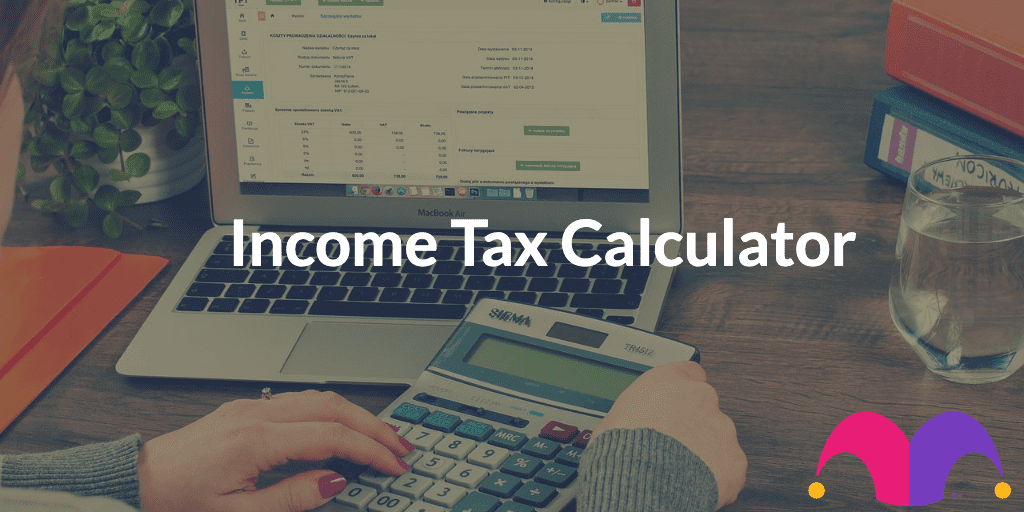Using an income tax calculator can help you to understand what your take home pay is likely to be and what your national insurance contributions are likely to be. Remember that tax treatment depends on your specific circumstances and may be subject to change in the future.
Tax calculators are designed to provide you with an indicative understanding of what tax you may be required to pay however subject to your specific circumstances, you may be required to pay more or less than the sum provided.
Income tax calculator: How much tax will I pay?
In order to really understand your income, you need to know how much of your pay is actually going to land in your bank account. Income tax calculators like ours help you to work out what you can expect to pay in both income tax and national insurance contributions.
What are national insurance contributions?
National insurance contributions are a tax that helps to build up your entitlement to certain state benefits, such as the State Pension and Maternity Allowance. They are calculated based on your pay for each pay period (monthly, weekly or other), not on an annual basis. So if you earn more in one month than another, you’ll pay extra national insurance that month, which is not something you can claim back.
How much income tax and national insurance will I pay?
When using a take home pay calculator, you will see that income tax and national insurance are separated out. This is because they are calculated slightly differently. How much national insurance you pay depends on your employment status and how much you earn. Meanwhile, how much income tax you pay depends on things like personal allowances, how much your income is and whether or not you qualify for any tax reliefs. This tax calculator does not take into consideration anything other than your gross annual salary and whether or not you have reached state pension age.
How is income tax calculated?
Income tax is quite simply a tax that you pay on your income. In order to calculate it more accurately, you need to know your personal allowance and what the marginal tax rates are for that tax year. A personal allowance is an amount of income you can earn each year before you need to pay income tax. It is not the same for everyone, as for those who earn over £100,000, their personal allowance will be reduced by £1 for every £2 earned. For those who earn over £125,140, income tax is paid on everything and there is no tax-free allowance. Your income tax is then calculated based on marginal tax rates, so as a percentage of your income within certain thresholds. This means that you don’t pay the same rate of tax on everything you earn. Your employer will be able to calculate the amount of income tax you need to pay based on your tax code.
Is tax calculated on gross or net income?
Gross income is what you get before any tax or deductions have been taken. Net income is what is known as your take home pay. So tax is always calculated on your gross income.
How do I calculate tax if I’m self employed?
Calculating your tax when you’re self employed is different to how you would calculate it if you were an employee. When it comes to income tax, in most cases, you pay this on your profits – not your total income. To work out your profits you will need to deduct your business expenses from your total income. Once you have done this, the income tax rates are the same as if you were employed. The only other difference is that you can earn an extra £1,000 tax-free as part of a trading or property allowance. Which class of national insurance contributions you pay (eg. Class 2 or Class 4), and on how much of your income, will depend on what your profits are. If you are not required to make national insurance contributions (for example, due to your profits being too small), you can choose to make voluntary contributions in order to avoid any gaps in your national insurance record. When you are self-employed, then you will need to complete your own tax self-assessment tax return before the tax deadlines.
How do I calculate future income tax?
It is difficult to calculate your income tax far into the future. This is because income tax rates and personal allowances are announced annually and apply to the coming tax year only, which runs from 6 April to the following 5 April.
How do I calculate income tax if I have more than one job?
How to calculate income tax if you have more than one job is largely about your personal allowance. The system is designed to treat one job as your main employment, against which your personal allowance will be given in full. However, if you have two jobs that pay below the personal allowance, then it can be split between them. In order to make sure you are paying the right amount of tax, you should check the tax codes on each of your jobs.
What happens if I pay too much income tax?
If after doing your tax calculation you believe you have paid too much tax, you can apply for a refund from the HMRC. The HMRC will send you a P800 or Simple Assessment to complete which will help to work out if you are correct and if you are owed any money.
The content in this article is provided for information purposes only. It is not intended to be, neither does is constitute, any form of tax advice as tax rules are complex, dependent on individual circumstances and may be subject to change in future. Readers are responsible for carrying out their own due diligence and for obtaining professional advice before making any decisions.
